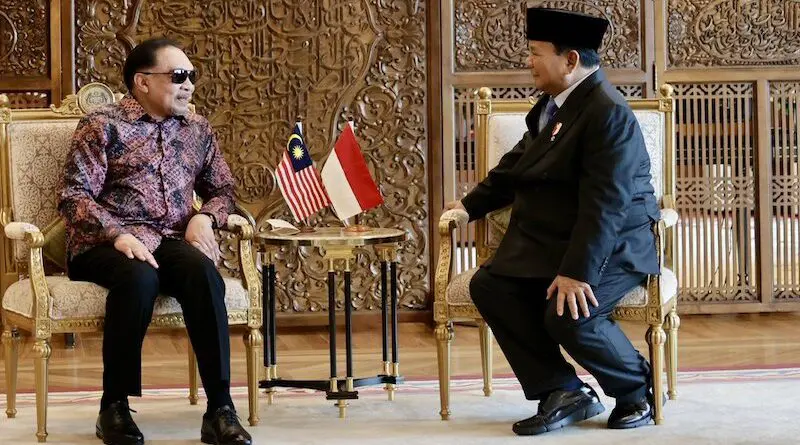Building Bridges And Boosting Prosperity: Indonesia-Malaysia Bilateral Relations 2020-2024 – OpEd
This paper presents an analysis of the diplomatic relations between Indonesia and Malaysia during the period 2020 to 2024. The historical key background areas of cooperation challenges faced in the relationship and prospects be will examined. The study will focus on interdependence cultural exchange initiatives and shared commitment to regional integration as significant factors contributing to the success of the bilateral ties. These factors underscore the importance of continued collaboration between two influential nations for the prosperity of Southeast Asia.
The diplomatic relations between Indonesia and Malaysia were established in 1957 coinciding with Malaysia’s independence from British colonial rule known as Malaya. Indonesia having independence gained in 1945 swiftly moved to establish diplomatic ties with Malaysia. This prompt action was driven by concerns about territorial potential and disputes future policies of neighboring Singapore which had recently integrated fully with Malaysia on 16 September 1963.
However, despite these challenges, the deep historical and cultural connections between Indonesia and Malaysia facilitated the expedient establishment of diplomatic relations. This essay aims to objectively examine the existence of these ties based on trade links security considerations, and social factors that support their cooperation. By emphasizing the regional context a comprehensive understanding of these neighboring actors is provided highlighting immediate geopolitical implications, geographical shared proximity, cultural heritage, and economic strength.
Building Bridges: Strengthening Trade Cooperation and People-to-Connections People
Indonesia and Malaysia have successfully developed cooperation robust across various domains. The “Visit Wonderful Indonesia” program serves an as exemplary instance of the commitment from nations both to foster cultural exchange. This program has effectively attracted Malaysian tourists to Indonesia allowing them to experience diverse tourist destinations gain and a deeper understanding of appreciation of Indonesian civilization.
Additionally, educational cooperation and the promotion of friendship have enhanced interactive activities between students including student exchange programs showcasing the mutual understanding and efforts of both nations to cultivate future leaders.
Economically Malaysia holds the position as Indonesia’s second-largest trading partner among the states. The two nations have engaged in efforts collaborative across several sectors including tourism agriculture and infrastructure development. A significant factor in expanding bilateral trade and reducing tariffs within the ASEAN economic framework has been the establishment of the Malay-originated Free Trade Agreement (FTA). Furthermore, governmental investments have increased and fostered political cooperation between the two countries.
Despite the existence of strong ties challenges persist within this strategic partnership. Bureaucratic barriers inadequate infrastructure and complex political dynamics impede investment opportunities. Nevertheless, both nations share a common objective of stability promoting and prosperity in Southeast Asia. To achieve this Indonesia and Malaysia have worked to closely address and resolve conflicts evidenced by their peaceful resolution of the standoff Ambalat. Additionally, efforts aimed at enhancing peace conflict and resolution in the region hold paramount importance.
Economic enhancing competitiveness through collaboration is another vital aspect of Indonesia-Malaysia relations. Together both countries can effectively combat transnational crimes and terrorism. It is imperative to control and establish authorities on both sides of the border and implement a unified checking system counter to terrorism efficiently. This collaborative endeavor will prove to be a valuable asset in addressing security-shared concerns.
Furthermore, education and tourism play interconnected roles as foundations for individuals to embrace socialization adapt to new environments, and appreciate cultural diversity. These sectors be should utilized to facilitate mutual understanding between cooperation with Indonesia and Malaysia. Looking ahead comprehensive infrastructure development should be pursued both by countries to strengthen connectivity. By improving highways railways and bridges, Indonesia-Malaysia can establish seamless transportation networks to consolidate its growth and economic and regional integration. Education must also be prioritized to ensure a competitive standing in globalized economies. Many countries have adopted student and academic exchange programs to address this need which not only support the demands of the economy global but also foster cultural exchange. Similarly, science and technology exchange programs have a significant role in facilitating knowledge-sharing and strengthening alliances. Additionally, tourism serves as another pillar of cooperation among visitors as indirectly contributes to the economies of the countries they visit through various means including air travel and hotel accommodations.
Despite historical prejudices and significant communication challenges, it is conceivable to perceive previous tumultuous as periods historical events. Indonesia and Malaysia have adopted proactive approaches to address their differences and with goodwill cooperation, a promising future is within reach. However, it is crucial not to dismiss territorial disputes and ongoing labor migration challenges. Both nations must remain dedicated to collaboration in their endeavors.
In conclusion in the aftermath of the post-pandemic era, a stable future is more essential than ever for Indonesia and Malaysia necessitating sustained economic collaboration that yields a more culturally robust cohesion. To this end, it recommended that a joint committee be established to formulate trade and investment policies. Additionally, there should be heightened collaboration in the tourism sector, joint initiatives to tackle transboundary issues like illegal fishing, and continued emphasis on student and cultural exchange programs in the future.
The opinions expressed in this article are the author’s own.
References
- Acharya, A. (2009). Constructing a Security Community in Southeast Asia: ASEAN and the Problem of Regional Order. Routledge.
- Chin, J. L., & Khoo, G. C. (2010). Malaysia: The Making and Unmaking of a Nation. University of Illinois Press
- Indonesia-Malaysia Relations Cultural Heritage, Politics and Labour Migration, b y Marshall Clark and Juliet Pietsch (2014)

